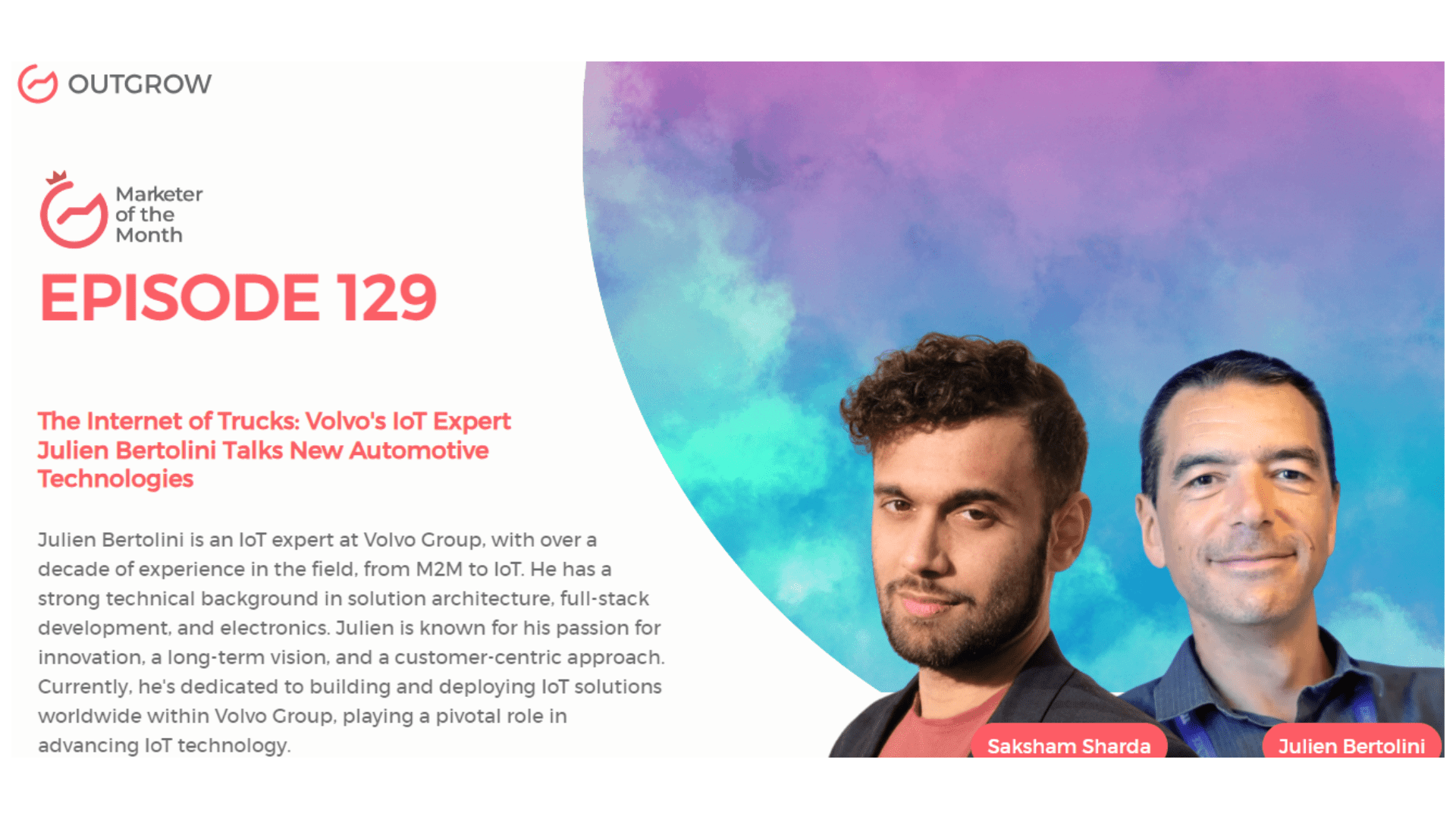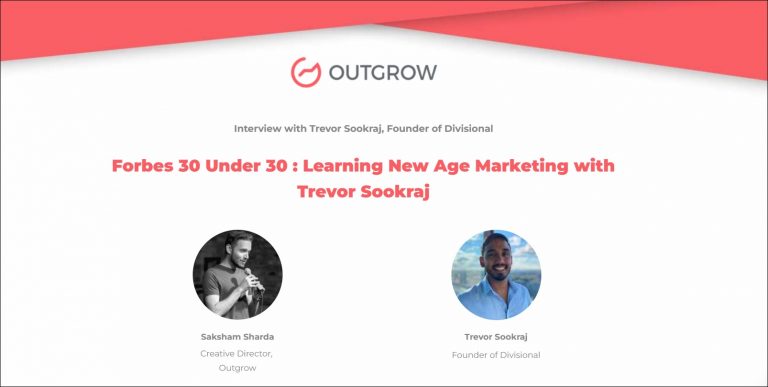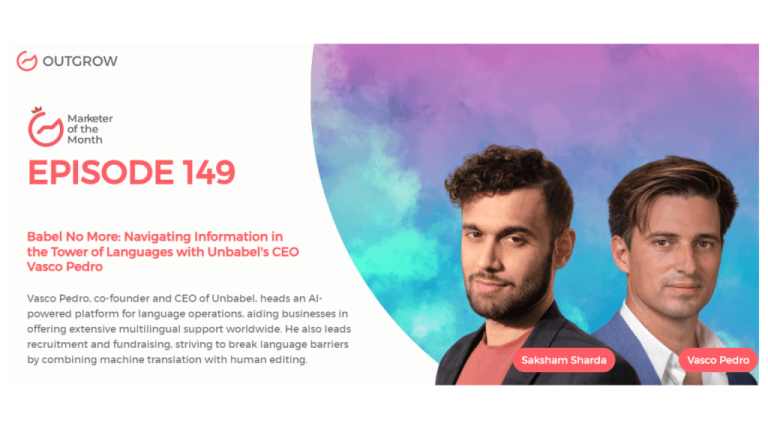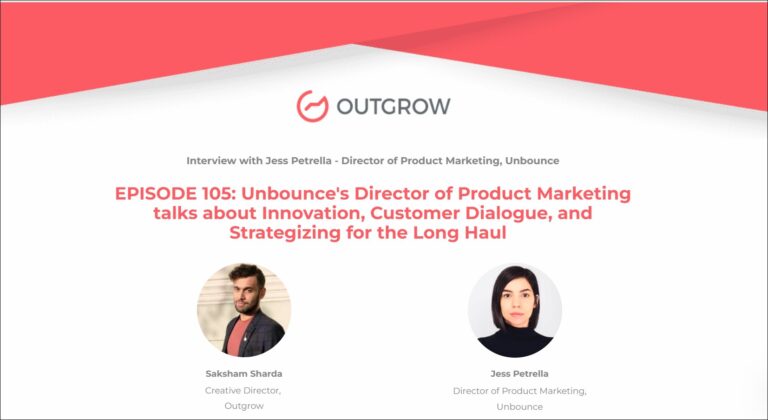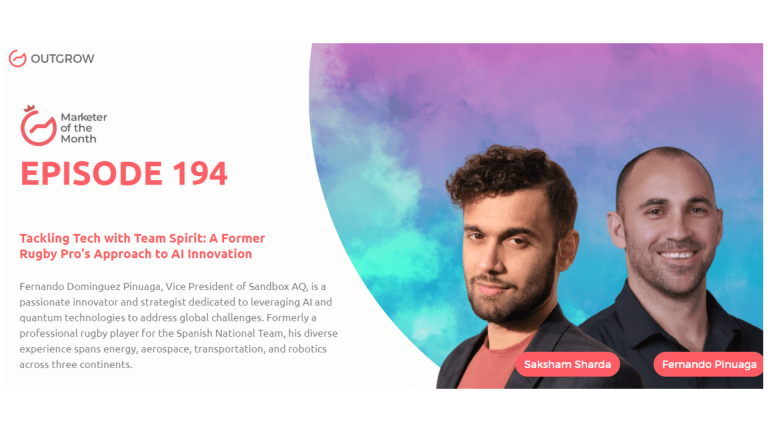Summarize with :
EPISODE 129: Marketer of the Month Podcast with Julien Bertolini
Table of Contents
Hey there! Welcome to the Marketer Of The Month blog!
We recently interviewed Julien Bertolini for our monthly podcast – ‘Marketer of the Month’! We had some amazing insightful conversations with Julien and here’s what we discussed about-
1. The Evolution of IoT: From M2M to a Complex Ecosystem.
2. Challenges in Implementing Industrial IoT Solutions.
3. Real-Time Truck Geolocation: Enhancing Operational Efficiency at Volvo Group.
4. Ensuring Security and Privacy in IoT Networks.
5. Fostering Collaboration in IoT: Volvo Group’s Approach.
6. 5G’s Impact on the Automotive Industry and IoT.
About our host:
Dr. Saksham Sharda is the Chief Information Officer at Outgrow.co. He specializes in data collection, analysis, filtering, and transfer by means of widgets and applets. Interactive, cultural, and trending widgets designed by him have been featured on TrendHunter, Alibaba, ProductHunt, New York Marketing Association, FactoryBerlin, Digimarcon Silicon Valley, and at The European Affiliate Summit.
About our guest:
Julien Bertolini is an IoT expert at Volvo Group, with over a decade of experience in the field, from M2M to IoT. He has a strong technical background in solution architecture, full-stack development, and electronics. Julien is known for his passion for innovation, long-term vision, and customer-centric approach. Currently, he’s dedicated to building and deploying IoT solutions worldwide within Volvo Group, playing a pivotal role in advancing IoT technology.
The Internet of Trucks: Volvo’s IoT Expert Julien Bertolini Talks New Automotive Technologies
The Intro!
Saksham Sharda: Hi, everyone. Welcome to another episode of Outgrow’s Marketer of the Month. I’m your host, Dr. Saksham Sharda, and I’m the creative director at Outgrow. co. And for this month we are going to interview Julien Bertolini, who is an IoT expert at Volvo Group.
Julien Bertolini: Great to be here. Thank you.
Don’t have time to read? No problem, just watch the Podcast!
Or you can just listen to it on Spotify!
The Rapid Fire Round!
Saksham Sharda: So I’m gonna start with the rapid-fire round. At what age do you want to retire?
Julien Bertolini: At 80.
Saksham Sharda: How long does it take you to get ready in the mornings?
Julien Bertolini: Something like between half an hour or one hour.
Saksham Sharda: Most embarrassing moment of your life?
Julien Bertolini: Pass.
Saksham Sharda: Favorite color?
Julien Bertolini: Red.
Saksham Sharda: What time of day are you most inspired?
Julien Bertolini: The morning.
Saksham Sharda: How many hours of sleep can you survive on?
Julien Bertolini: Three hours.
Saksham Sharda: Fill in the blank. An upcoming technology trend is _____.
Julien Bertolini: Innovative.
Saksham Sharda: The city in which the Best Kiss of your life happened?
Julien Bertolini: Léo.
Saksham Sharda: Pick one, Mark Zuckerberg or Elon Musk.
Julien Bertolini: Elon Musk.
Saksham Sharda: The biggest mistake of your career?
Julien Bertolini: Feeling that I am invincible.
Saksham Sharda: How do you relax?
Julien Bertolini: Usually I’m doing sports, mountain biking, or hiking.
Saksham Sharda: How many cups of coffee do you drink per day?
Julien Bertolini: Something like 10.
Saksham Sharda: A habit of yours that you hate?
Julien Bertolini: Smoking.
Saksham Sharda: The most valuable skill you’ve learned in life?
Julien Bertolini: Listening to people
Saksham Sharda: Your favorite Netflix show?
Julien Bertolini: Makdee.
Saksham Sharda: What was the last movie that you watched that was memorable for you?
Julien Bertolini: Pass.
Saksham Sharda: The last song you listened to that you liked?
Julien Bertolini: Pass.
The Big Questions!
Saksham Sharda: So this is the end of the rapid-fire round. Is there any rapid-fire question that you want to elaborate on in more detail? Or do you want to move on to the longer questions?
Julien Bertolini: No, it is good.
Saksham Sharda: So the longer question, can you share with us your journey in the Internet of Things industry from the early days of M to M to the current state of IoT? How has the industry evolved over the past 15 years?
Julien Bertolini: Yeah, I’ve seen the whole journey from machine to machine to the IoT. And you know, first, it was always the same principle to gather some data. So it could be from sensors, for example. And send the data to an internet platform. So the principle was always the same. But at the beginning we just created the protocols, created the gateways, created the technology, so to be able to do that. So it was a long and difficult work. It was really low level. So you have to understand electronics and low-level development. And little by little I’ve seen that there were more and more standouts and more and more gateways that were multiprotocol and more and more IoT platforms in the market. And now it’s like crazy, we have more than 600 IoT platforms in the market. We have a bunch of start-ups that are taking care of cybersecurity that takes care of the reliability of communication. So we came to a homemade solution to a real industry and even it’s close to being a commodity. So I mean, in a few years, we will not talk about IoT anymore, I can see that. In a few years, It will be just nothing we won’t mention because it will be just a community.
Saksham Sharda: So you mentioned cybersecurity, but besides that, what are the main challenges that companies face when implementing IoT solutions? And how do you address them at Volvo Group?
Julien Bertolini: Yeah, if I talk about industrial IoT, so really the IoT for the industry 4.0 because it’s my domain. One of the biggest challenges is the heterogeneity of the equipment of industrial equipment in factories because it’s quite easy to do IoT. For example, if you are a Tesla, you’re building a new factory from scratch, but most industrial companies are working with old factories. So we have brand new technology and really old technologies. And everything has to work together. And that’s one of the biggest challenges.
Saksham Sharda: Could you provide some examples of IoT deployments at Volvo Group and how they have improved operational efficiency or customer experience?
Julien Bertolini: Yeah, we have deployed 10s of solutions in production now, but one of them, it’s one of the first that I like, is a solution to geolocate our trucks. And, if you’re in a factory yard, it’s pretty hard to geolocate your trucks, because even if a truck is a big thing or a big vehicle, we have several hundreds of tracks on a huge factory yard, and most of them are white. So it’s quite difficult to find the right one for walking. So what we have done is, we have deployed a solution to geolocate the trucks in real-time. And we have deployed the solution in 17 factories. So it’s quite a big deployment. So we are sure to locate several 1000s of trucks every day. And it brings a lot of value to the business because, before we had a solution, they were writing down the position of the trucks in the factory yard. So it takes time for the worker to do that. And there were a lot of mistakes. So when one mistake happens, it takes something like two hours for two people to find the right track. So a big waste of time. And it’s so comfortable for the worker to always have the position of the track in real-time. They don’t make any mistakes anymore. It’s super easy, and it brings a lot of value.
Saksham Sharda: With the increasing connectivity of vehicles, how do you ensure the security and privacy of data transmitted to IoT networks?
Julien Bertolini: Well, we’re just following the state of the art from cybersecurity. As I said before, now there are a lot of startups, and it was not like at the beginning of 5G, there were a lot of startups, a lot of small companies that we’re launching. I would say gadget devices that were easily hackable. But now it’s not the case, if you follow the right policy, if you follow the rules. And if you have a state of the art in cybersecurity, you’re not 100% safe, but you have a good level of security quite easily, I would say.
Saksham Sharda: So as the IoT community lead at Volvo Group, how do you foster collaboration and knowledge sharing among more than 200 people working on IoT issues?
Julien Bertolini: Yeah, it’s always a big challenge for this community to keep it alive. And so we have several channels, for example, where we have a Yammer channel to just share some fun stuff and any progress we are making. We also have a SharePoint to have like the official document and the official status of the project and initiative. But we’re also using Stack Overflow for the forum for more question stuff. We’re using Confluence for the wiki. So more like a Wiki way of talking. And we’re also using a newsletter, so a monthly newsletter is sent by email to keep members informed. And you know, one of the biggest challenges if you want to build the community globally, is to have a relay all over the countries so for some countries they have a good relay and it works well for some others the relay is weaker and it works a little bit. It’s a little bit harder. So that’s always a big challenge. And I can say that it’s a success because there are more than 200 people. They are always listening to the video or listening to the podcast and reading the article. So it works well. And one of my biggest challenges is for people to push people to produce content. So when you produce content, it works. A lot of consumers but fewer producers, that’s always a big challenge.
Saksham Sharda: So the 5G IoT market is projected to grow significantly in the coming years. What are the key factors contributing to this accelerated growth? And what opportunities does it present for businesses?
Julien Bertolini: Well, the 5g, I can see a big interest in autonomous vehicles, and we’re working a lot to have an autonomous vehicle, especially in the construction equipment. Because it’s easier than on the road. But for the industry, we have so much to do before 5G That it’s not going to be like a revelation for me in the coming few years.
Saksham Sharda: So can you then share some insights into the potential benefits and challenges of implementing IoT in the transportation and logistics sector?
Julien Bertolini: Yeah, so in logistics, that’s a domain where the IoT can bring a lot of value. And I have the feeling that we are just at the beginning, because being able to track any assets, so it could be a packaging, it could be the product inside the packaging, or it could be a rack, it could be a different kind of thing. At Volvo, we have a crazy logistic flow, you cannot imagine the number of logistic flows to build one track. So that’s a huge challenge for us. While working on it, we are working hard to have a good track-and-trace solution for the logistics. And yeah, I’m convinced that it will bring a lot of value in the future.
Saksham Sharda: So is there something exciting about it that you are currently working on?
Julien Bertolini: Well, I’m working on a big solution, a big tool to deploy in all Volvo factories, and this tool will help shopfloor people to connect any industrial equipment to visualize any data and to be notified of any specific conditions that they will define. So it’s like giving all the power of IoT to people without any IT skills, they will be able to use it without any development skills.
Saksham Sharda: How’s the evolution of the automotive industry with IoT influencing the 5G IoT market? What are some specific use cases where 5G and IoT are revolutionizing the automotive sector?
Julien Bertolini: Well, definitely the autonomous vehicle is the next revolution in transportation. And also another really important thing is for transportation to be a service. So you know, Volvo will not sell trucks in 10 years, they will sell kilometers. And that will be a tremendous shift in the way of doing your business.
Saksham Sharda: And so how can businesses and organizations overcome the challenges of fully leveraging the potential of 5G IoT?
Julien Bertolini: So, the analysts said that more than 70% of the IoT initiatives failed, and it is always for the same reason, that we can see that we are making a mistake with the organization. Because we didn’t collaborate enough between the IT and the OT community. So we have to build a better organization for that. A second reason is to scale up people because it’s new technology. And, you know, you need to train people for that. And the third reason, and it’s not the least, it’s to have some foundation. So if I talk about IoT, everybody in your company should work on the same platform using the same protocol. So they can share their knowledge, and they can build something together. That’s an important thing.
Saksham Sharda: Are there any emerging trends or technologies in the IoT space that you find particularly exciting or promising for the future of the industry?
Julien Bertolini: Yeah, all the technology around positioning, where the Wi-Fi 6 lowrise is coming with new technology for the positioning, we also have more and more satellites in the sky, so all these positioning technologies are becoming more and more accurate, and also less and less expensive. So I think that’s exciting.
Saksham Sharda: So the last question for you is of a personal kind. What would you be doing in your life, if not this right now?
Julien Bertolini: Wow, that’s a great question. I’m passionate about what I’m doing. I can live in the mountains and just enjoy life.
Let’s Conclude!
Saksham Sharda: Thanks, everyone for joining us for this month’s episode of Outgrow’s Marketer of the Month. That was Julien Bertolini, who is an IoT expert at Volvo Group.
Julien Bertolini: Pleasure. Thanks for having me.
Saksham Sharda: Check out the website for more details and we’ll see you once again next month with another marketer of the month.

Muskan is a Marketing Analyst at Outgrow. She is working on multiple areas of marketing. On her days off though, she loves exploring new cafes, drinking coffee, and catching up with friends.

